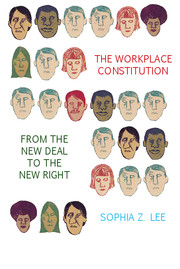
The Workplace Constitution Reveals that the U.S. Constitution lacks any particular political valence.
For me, the most impressive aspect of The Workplace Constitution is Sophia Lee’s insight that the African-American effort to secure constitutional rights in the workplace – primarily, in the part of her story that I found most thought-provoking, against racially exclusionary unions – should be juxtaposed to the development of conservative right-to-work efforts to do “the same,” that is, to establish that individual workers had a constitutional right, here too against unions, to be free from a statutory obligation to pay dues to unions. For readers like me, interested in both legal history and constitutional theory, the juxtaposition shows that “the Constitution” has no particular political valence.
At some times, with respect to some issues, and in connection with some constitutional rights, vindicating a constitutional right will have a liberal tendency. At other times, with respect to either the same issues or different ones, and in connection with either the same issues or different ones, vindicating constitutional rights will have a conservative tendency. That point has been made before, of course, for example in the literature on ideological drift and preservation through transformation (otherwise known as “hegemony”), and I don’t suggest that Professor Lee offers it as a novel insight. But it does clearly emerge from her detailed narrative.
On reading The Workplace Constitution, I was provoked as well by the thought that this particular study might show why constitutional rights lack political valence. Or, more precisely, why constitutional rights as they are conceptualized in the United States lack political valence. In both parts of her story, Professor Lee shows workers claiming constitutional rights essentially as individuals, although African Americans claimed them as a predicate to claiming in full their statutory rights. Racially exclusionary unions violated the constitutional rights of workers to participate in workplace governance as individuals through their union; forcing objectors to pay union dues violated their individual right to free expression. Would things have worked out differently had there been a constitutional tradition on which African-American workers could have drawn to support a claim that they had a constitutional right as a group to bargain collectively with their employers, whether or not there was another union doing the same?
 Emporium Capwell, a U.S. Supreme Court case detailed late in Professor Lee’s story, held that African-American workers did not have a statutory right of that sort, but by that time the possibility of a constitution of group rights was off the table – if it had ever been on the table. And, for me, that’s another important point emerging from The Workplace Constitution: When African-American workers began their attempt to constitutionalize their workplaces, they had no legal tradition of group rights upon which to build. And, for all practical purposes, none has been developed in the century or more since.
Emporium Capwell, a U.S. Supreme Court case detailed late in Professor Lee’s story, held that African-American workers did not have a statutory right of that sort, but by that time the possibility of a constitution of group rights was off the table – if it had ever been on the table. And, for me, that’s another important point emerging from The Workplace Constitution: When African-American workers began their attempt to constitutionalize their workplaces, they had no legal tradition of group rights upon which to build. And, for all practical purposes, none has been developed in the century or more since.
Many modern constitutions, written after the rise of social democracy, explicitly guarantee a right to unionize, to bargain collectively, and to strike (conceptualized in these constitutions as a right independent of rights of free expression). The Canadian Supreme Court, interpreting a Charter of Rights that is liberal and communitarian rather than social democratic, has held that there is a constitutional right to bargain collectively. Notably, both the social democratic and communitarian traditions have substantial “group” elements built into them, both as a matter of their historical formation and as a matter of their conceptual foundations. Professor Lee’s story, then may be one about the way in which a purely liberal constitutionalism makes some constitutional claims available and others much more difficult to frame.
Not only an important contribution to legal history, then, The Workplace Constitution is important for those interested in constitutional theory.
This essay is part of a six-part series, The Struggle Over the Constitution in the Workplace.




